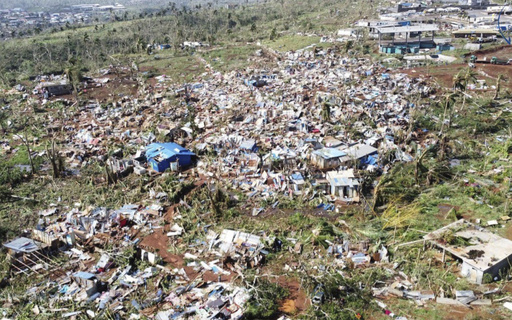MAMOUDZOU, Mayotte — On Monday, France mobilized military ships and aircraft to deliver aid and rescuers to Mayotte, an island territory off the coast of Africa, which has just endured its most severe cyclone in nearly a century. Authorities anticipate that the death toll could soar into the hundreds, even thousands.
Survivors are now navigating through their devastated neighborhoods, where debris is strewn across the streets, in a desperate quest for water and shelter after Cyclone Chido struck on Saturday. It caused significant destruction in Mayotte, the most impoverished area of France and the European Union.
French President Emmanuel Macron has announced plans for a national mourning period and intends to visit the territory in the upcoming days, expressing that this incident has profoundly affected everyone involved.
Local resident Fahar Abdoulhamidi described the scene of devastation as chaotic. In Mamoudzou, the capital city, there was widespread destruction; schools, hospitals, restaurants, and offices were left in ruins. Winds exceeding 220 kph (136 mph) tore roofs off homes and severely damaged trees throughout the area.
French Interior Minister Bruno Retailleau reported that approximately 70% of the local population has been severely impacted. As of Monday evening, officials confirmed 21 fatalities at hospitals, with 45 individuals in critical condition. However, Health Minister Geneviève Darrieussecq cautioned that these figures might represent a severe underestimate given the scale of the disaster.
The entire archipelago is experiencing power outages, with communication networks down due to significant damage to transmitting antennas. Authorities are concerned about the potential shortage of potable water.
The French Red Cross characterized the devastation as beyond comprehension and indicated that search efforts to locate bodies are still ongoing. Damage to Mayotte’s sole airport has left certain areas inaccessible to emergency responders.
Many residents disregarded cyclone warnings in the day prior to the storm, underestimating its potential. “Nobody believed it would be that big,” Abdoulhamidi recounted, noting that some chose to remain in their homes, fearing theft in their absence.
Additionally, many migrants opted out of seeking shelters due to fears of facing deportation, according to Abdoulhamidi’s observations.
Mayotte is a heavily populated archipelago between Madagascar and the African mainland, home to over 320,000 residents. A significant majority are Muslim, and French authorities have estimated an additional 100,000 migrants from regions such as Somalia living in the territory.
“There’s no water, no electricity. Hunger is on the rise. It’s critical that aid arrives quickly, especially for children and infants in need,” Mayotte Senator Salama Ramia expressed in an interview.
Cyclone Chido reached category 4 status, making it the most potent cyclone to strike Mayotte since the 1930s. Prefect François-Xavier Bieuville mentioned that initial estimates suggested several hundred lives lost, potentially climbing into the thousands, emphasizing that many deceased might remain unaccounted for due to cultural practices regarding burials.
In response, rescue teams and supplies have been dispatched from mainland France and Reunion Island. Daily deliveries of 20 tons of water and food are being conducted to meet urgent needs, affirmed Retailleau.
The main airport in Mayotte remains closed for civilian flights because of major damage to its control tower and is not expected to reopen until at least Thursday. The principal hospital on the island experienced notable flooding in its key departments, leading to plans for a field hospital’s arrival later this week.
The Interior Ministry is sending an additional 1,500 personnel, including both civilian and military teams, to assist with public safety and infrastructure restoration, including 400 gendarmes.
Local authorities are concerned about potential looting during this period of upheaval, prompting the increased presence of police and gendarmes to support the community.
Historically, residents have voiced concerns over the lack of investment and attention from the French government. Poverty afflicts about three-quarters of the population, with a median annual income significantly lower than that of the Paris metropolitan area. The territory has also experienced political tensions, and last year, the French military intervened to manage protests following a severe drought leading to water shortages.
Following Mayotte, Cyclone Chido advanced westward and impacted Mozambique, resulting in three deaths and significant damage to educational facilities. In neighboring Malawi, two fatalities were reported due to the cyclone.
The cyclone season in the southwestern Indian Ocean typically runs from December to March, leaving southern Africa vulnerable to extreme weather events. Cyclone Idai in 2019 claimed more than 1,300 lives across Mozambique, Malawi, and Zimbabwe, while Cyclone Freddy resulted in over 1,000 deaths in various countries within the region last year.
In a show of solidarity, the European Parliament held a moment of silence in tribute to the victims of Cyclone Chido, with President Roberta Metsola emphasizing, “Mayotte is part of Europe, and Europe will not abandon you.”


